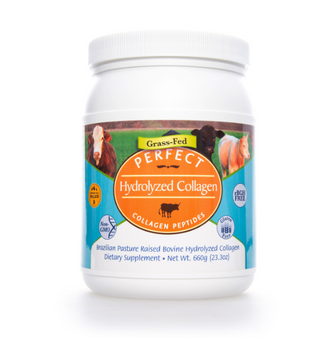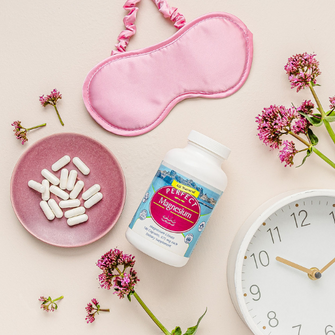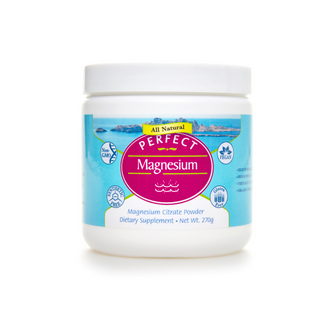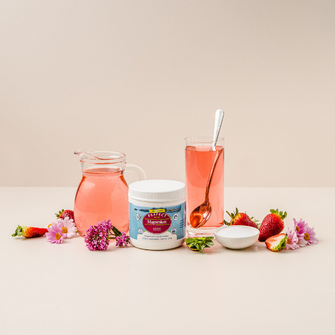Categories
While the amount of sleep we need as adults don’t change much (7-9 hours, if you're wondering), our ability to sleep well does.
Thank increased sleep-destroying stress levels (many of us are at our career peaks in our 40s and 50s), sizable family commitments (children and aging parents), too much screen-time and inactivity, and changing hormones levels.
Hormonal Changes and Sleep Disruption
During perimenopause, which starts anywhere after the age of 35, our oestrogen and progesterone levels decrease, which can cause sleep changes. As our bodies adapt to the decreasing levels of these two hormones, we may have more trouble falling asleep and staying asleep.
Natural Sleep Tips for Women Over 40
Instead of leaning on addictive pharmaceuticals to help you fall asleep, it's much better for you in the short and long-term to teach your body how to sleep well on its own.
There are plenty of ways to do this safely and naturally, and they won't only benefit your sleep, but also your overall health, resulting in fat loss, increased energy and focus, better skin and a more robust immune system. (And more—keep reading!)
Here are the best natural sleep tips for women over 40.
- Get Outside
Remember when you were a kid and a day playing outside left you so physically spent that you were asleep before your head hit the pillow?

It can happen again! Sure, we can't blow off work and spend the whole day frolicking in the sun, but we can make a commitment to spend more time being active outside. The trifecta of fresh air, sunshine (hello, stress-busting vitamin D!) and exercise is a powerful panacea to cure the broken-sleep blues.
- Use Collagen
Collagen is praised as a mood relaxing and sleep-inducing supplement. In fact, a serving of collagen before bed (or as part of your last meal before bed, if you fast) can help you sleep significantly better.
Of course, as with just about anything in life, quality matters. You want your collagen to be grass-fed and 100% pure to ensure it is easily and purely absorbed into your body.
Try our Perfect Hydrolyzed Collagen for a potent uptake and blissfully snooze-worthy results.
- Avoid Caffeine After Noon
Caffeine is a stimulant, which can make it difficult to sleep. And while caffeine has many benefits, these benefits cannot undo the dangers of chronically poor sleep.
Save your cup of java for the morning if sleep matters to you.

- Avoid Alcohol on Weeknights
It's a double-edged sword and I have had my own journey with drinking wine mid-week so if you're someone who gives in to the urge for a weeknight vino, I completely understand but you may be worse off for it, read on...
Though a glass of wine may make you initially feel more relaxed and sleepier, alcohol actually disrupts sleep. So, avoid it on weeknights or anytime you don't have the luxury of sleeping in.
Not to mention, that drinking alcohol regularly can cause oestrogen dominance which further impacts the delicate balance of our hormones.
If you're interested to learn more about this, you can check out my other article here.
- Try Rhodiola
This beautiful yellow herb is native to the mountainous regions of Asia and Europe and is renowned for its sleep-promoting qualities. It is also used widely and successfully to reduce stress, increase brain function, boost athletic performance and sexual function and it’s been shown to support fat loss.

Definitely, worth a try, I say! And you won't be disappointed. Try our Perfect Rhodiola Rosea for a high-quality and effective dose of pure Rhodiola made with 100% Siberian Rhodiola Rosea Root.
- Top Up Your Magnesium Levels
Magnesium deficiency has been linked to poor sleep. Topping up your magnesium levels is as easy as taking a high-quality magnesium citrate supplement for max efficacy (we've got you covered--check out Perfect Magnesium-Citrate Powder), or eat a few servings of these magnesium-rich foods every day:
Spinach
Kale
Figs
Raspberries
Avocado
Banana
Legumes
Peas
Broccoli
Brussels sprouts
Asparagus
Artichokes
Salmon
Mackerel
Tuna
Even if you eat a magnesium-rich diet, you can still be low in this crucial mineral because if you’re like most people, you have daily stress and stress basically gobbles magnesium up like Pacman eating his favourite snack pellets!
Grab Perfect Magnesium-Citrate!
- Meditate Before Bed
Whether your meditation takes the form of a quiet walk, a bath with sleep-inducing essential oils (ylang-ylang, lavender, geranium--try my Get Glowing Scrub), or a more traditional static relaxation practice, meditation is a wonderfully effective way to calm your mind and prepare yourself for sleep.

Photo by Engin Akyurt from Pexels
- Keep a Notepad By Your Bed
If thoughts are keeping you up at night, keep a notepad by your bed to write them down. This way, you get those pesky repetitive thoughts out of your head and, if you needed to remember something, you know it is recorded in a place you'll see in the morning.
I have found this to be a great tool for dumping pesky thoughts out of my head to help me fall asleep and get a good nights rest.
- Sleep in a Cool, Dark Room
I'm talking quite cool (16-19 celsius if possible) and absolutely dark. No screens--no, not even your mobile phone, tablet or any device that emits light. In fact, the EMF from your phone disrupts your sleep so don't even have it in the same room.
The room should be so dark you can't even see your hand in front of your face and cool enough to trigger your body into that hibernation state. The darkness will stimulate your body's production of melatonin, a hormone that signals sleep.
Melatonin (made by your pineal gland) is one of the most powerful antioxidants in our body! Antioxidants are crucial for helping slow down the ageing process and keeping our body healthy.
You may already be doing some of these sleep-promoting strategies, but adding a few more will only enhance your sleep and help you reap all the rewards of life well-rested.
Please share your sleep tips in the comments! 😴
References:
https://www.sleep.org/articles/temperature-for-sleep/
https://thesleepdoctor.com/2018/07/23/understanding-glycine/
https://www.healthline.com/health/menopause/menopause-and-insomnia
https://www.healthline.com/nutrition/magnesium-deficiency-symptoms
https://www.healthline.com/nutrition/melatonin-and-sleep
Disclaimer: This article is strictly for informational purposes and is not intended as health advice. Statements made have not been evaluated by the TGA and are not intended to treat, diagnose, cure or prevent and one should always consult with their trusted health professional before adding a new supplement to their diet.












